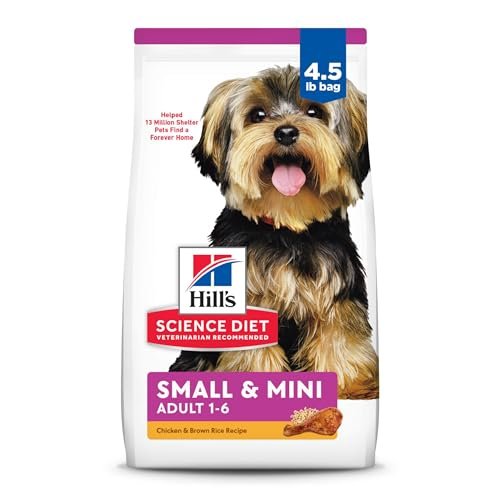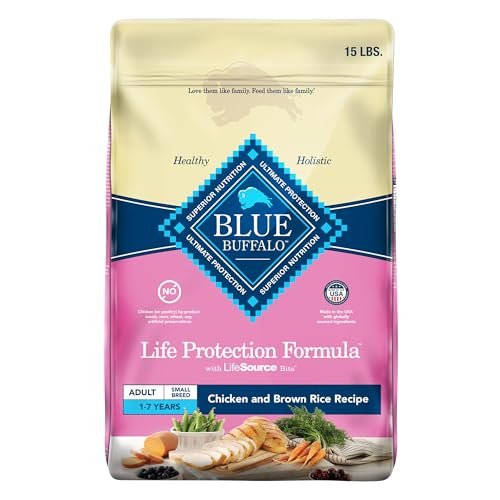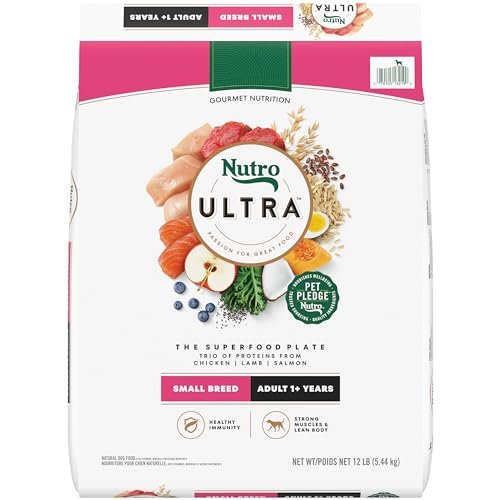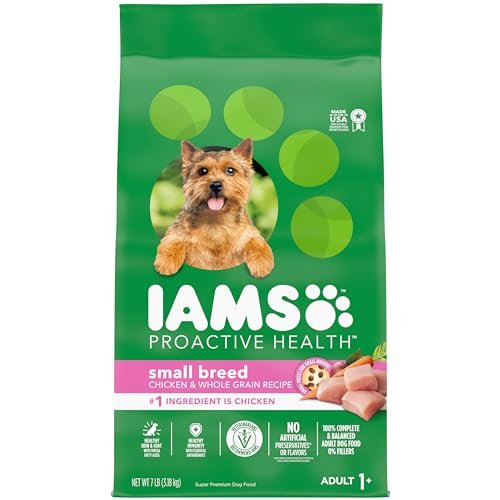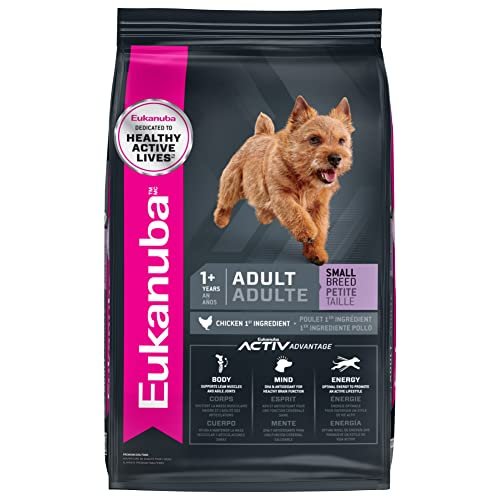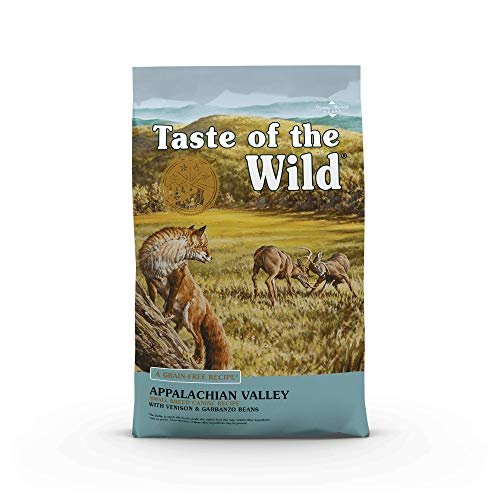Maltese dogs are tiny, energetic pups with specific dietary needs that require careful consideration.
From protein content to kibble size, every aspect of their food plays an essential role in maintaining their health and liveliness.
But with countless options on the market, how do you determine what’s truly best for your furry companion?
The answer isn’t as straightforward as you might think, and there are several factors you’ll need to weigh before making your decision. Let’s explore what makes an ideal diet for these adorable little dogs.
To come up with our dog food guides, we’ve created a panel of 7 professional canine nutritionists who help us gather expert opinions on various dog food products.
Their insights were crucial in selecting the best options specifically tailored for the Maltese breed, ensuring our recommendations are backed by professional expertise.
Maltese Diet: What Can Maltese Dogs Eat?

Your Maltese needs a balanced, calorie-dense diet to thrive. You’ll want to focus on high-quality protein sources, healthy fats for energy, and complex carbs to keep your pup fueled throughout the day.
Including necessary vitamins and minerals is important for supporting your Maltese’s overall health and well-being.
Much like we’ve discussed in our guide to the best dog food for Corgis and the focus on Miniature Schnauzers’ diet, you shouldn’t forget about essential nutrients that support your Maltese’s beautiful coat – they’re essential for maintaining that signature silky fur.
High-Quality Protein Sources
When it comes to feeding your Maltese, high-quality protein sources are the cornerstone of a balanced, calorie-dense diet.
You’ll want to look for dog foods that feature named animal proteins like chicken, beef, fish, or lamb as the main ingredients.
These high-quality proteins should make up about 28% to 36% of your Maltese’s diet, ensuring they get the nutrients needed for muscle maintenance and overall health.
Our Nutritionists Say: Look for dog foods with specific meat sources listed as the first ingredient. Avoid generic terms like “meat by-products” to ensure your Maltese gets the best nutrition possible.
You should also include moderate fat content in their diet, which provides essential energy, similar to the recommendations for other small breeds – need an example? See the French Bulldog diet page – individual dietary needs vary.
Healthy Fats for Energy

These tiny powerhouses need a diet that’s rich in quality fats, making up about 17-25% of their total food intake.
Healthy fats, especially omega-3 and omega-6 fatty acids, support your pup’s energy, skin health, and coat shine.
To guarantee peak health, it’s important to look for high-quality dog foods that meet nutritional requirements for different breeds and provide essential nutrients tailored to your Maltese’s needs.
Vet’s Tip: Our top picks for Maltese include wet dog foods rich in healthy fats like salmon-based formulas, and dry foods with added fish oil or flaxseed for optimal omega fatty acid content.
Consider adding fish oil or flaxseed to boost brain function and joint health, particularly for older dogs. But don’t go overboard!
Maltese can easily pack on extra pounds, so keep a close eye on their fat intake.
Complex Carbs for Energy
Complex carbohydrates are the unsung heroes of your Maltese’s diet. These powerhouse nutrients provide a steady stream of energy for your furry friend, keeping them active and playful throughout the day.
For small breed dogs like Maltese, a diet with about 44% complex carbs is ideal. It’s all about balance!
Vet’s Tip: Look for dog foods containing brown rice, barley, or oats. These ingredients are easy for Maltese to digest and are packed with fiber for a happy tummy.
Best Dog Food for Malteses: Our Picks
Selecting the ideal food for your Maltese requires careful consideration of their unique nutritional needs.
Small breed dogs like Malteses benefit from high-quality, protein-rich diets that support their energetic lifestyle and maintain their luxurious coat.
Our curated list features top-rated brands offering both dry and wet food options, specially formulated for different life stages.
From premium choices to more budget-friendly alternatives, we’ve compiled a diverse selection to help you find the perfect match for your Maltese companion.
Royal Canin Maltese Adult Dry Dog Food, Royal Canin
as of February 24, 2026 2:10 pm
Price History
Statistics
| Current Price | $24.99 | February 24, 2026 |
| Highest Price | $24.99 | August 21, 2025 |
| Lowest Price | $24.99 | August 21, 2025 |
Last price changes
| $24.99 | August 21, 2025 |
Tailored specifically for Malteses, this formula addresses the breed’s distinctive requirements. Its kibble shape promotes dental health, while omega-3 and omega-6 fatty acids nourish the coat. The balanced protein content supports muscle maintenance without promoting weight gain.
Hill’s Science Diet Small Paws for Small Breeds, Hill's Pet Nutrition Sales, Inc.
as of February 24, 2026 2:10 pm
Price History
Statistics
| Current Price | $23.99 | February 24, 2026 |
| Highest Price | $23.99 | August 13, 2025 |
| Lowest Price | $21.11 | August 7, 2025 |
Last price changes
| $23.99 | August 13, 2025 |
| $21.11 | August 7, 2025 |
Formulated with small breeds in mind, this food provides optimal nutrition for Malteses. It contains high-quality protein for lean muscle maintenance and a blend of antioxidants to support a healthy immune system. The small kibble size is perfect for tiny Maltese mouths.
Wellness CORE Natural Grain Free Small Breed, WellPet LLC
as of February 24, 2026 2:10 pm
Price History
Statistics
| Current Price | $47.98 | February 24, 2026 |
| Highest Price | $47.98 | August 21, 2025 |
| Lowest Price | $47.98 | August 21, 2025 |
Last price changes
| $47.98 | August 21, 2025 |
This grain-free option is packed with premium proteins and superfoods. It’s an excellent choice for Malteses with sensitivities, offering a nutrient-dense meal that supports overall health and vitality. The recipe includes probiotics for digestive health and glucosamine for joint support.
Blue Buffalo Life Protection Formula Small Breed, Blue Buffalo Company, Ltd
Price History
Statistics
| Current Price | - | February 24, 2026 |
| Highest Price | 61.92 | November 6, 2025 |
| Lowest Price | 40.00 | May 29, 2025 |
Last price changes
| 40.00 | November 11, 2025 |
| 61.92 | November 6, 2025 |
| 41.98 | October 27, 2025 |
| 40.00 | October 26, 2025 |
| 41.98 | October 23, 2025 |
Featuring real meat as the first ingredient, this formula provides high-quality protein for your Maltese. It includes LifeSource Bits, a blend of antioxidants, vitamins, and minerals to support immune health. The smaller kibble size is ideal for your Maltese’s petite mouth.
Merrick Lil’ Plates Grain Free Small Breed Recipe, Merrick Pet Care
as of February 24, 2026 2:10 pm
Price History
Statistics
| Current Price | $49.98 | February 24, 2026 |
| Highest Price | $49.98 | August 21, 2025 |
| Lowest Price | $49.98 | August 21, 2025 |
Last price changes
| $49.98 | August 21, 2025 |
This grain-free recipe is crafted with deboned meat, fruits, and vegetables. It’s an excellent option for Malteses with grain sensitivities. The formula includes glucosamine and chondroitin for joint health, crucial for small breeds prone to patellar luxation.
Nutro Ultra Small Breed Adult Dry Dog Food, Mars Petcare
as of February 24, 2026 2:10 pm
Price History
Statistics
| Current Price | $49.99 | February 24, 2026 |
| Highest Price | $49.99 | August 21, 2025 |
| Lowest Price | $49.99 | August 21, 2025 |
Last price changes
| $49.99 | August 21, 2025 |
A trio of proteins (chicken, lamb, and salmon) provides a well-rounded amino acid profile for your Maltese. The recipe includes a superfood blend of chia, kale, and blueberries for added nutrition. Its smaller kibble size is perfect for your Maltese’s tiny teeth.
Purina Pro Plan Focus Small Breed Formula, Nestle Purina Pet
as of February 24, 2026 2:10 pm
Price History
Statistics
| Current Price | $54.48 | February 24, 2026 |
| Highest Price | $54.48 | May 29, 2025 |
| Lowest Price | $54.48 | May 29, 2025 |
Last price changes
| $54.48 | May 29, 2025 |
This formula is designed to meet the high energy needs of small breeds like Malteses. It contains real chicken as the first ingredient and is fortified with live probiotics to support digestive health. The crunchy kibble helps reduce tartar buildup, promoting dental health.
Iams ProActive Health Small & Toy Breed, IAMS
as of February 24, 2026 2:10 pm
Price History
Statistics
| Current Price | $15.97 | February 24, 2026 |
| Highest Price | $15.97 | August 21, 2025 |
| Lowest Price | $15.97 | August 21, 2025 |
Last price changes
| $15.97 | August 21, 2025 |
An affordable option that doesn’t compromise on quality, this formula provides tailored nutrition for small breeds. It contains farm-raised chicken and a special fiber blend with prebiotics to support digestive health. The L-carnitine helps maintain a healthy metabolism in your Maltese.
Eukanuba Small Breed Adult Dry Dog Food, Royal Canin
as of February 24, 2026 2:10 pm
Price History
Statistics
| Current Price | $77.99 | February 24, 2026 |
| Highest Price | $77.99 | August 21, 2025 |
| Lowest Price | $77.99 | August 21, 2025 |
Last price changes
| $77.99 | August 21, 2025 |
Formulated to provide optimal nutrition for small breeds, this food contains high-quality animal proteins to support lean muscle mass. It includes a specialized fiber system to promote nutrient absorption and easy stool pick-up, a plus for Maltese owners.
Taste of the Wild Appalachian Valley Small Breed, Diamond Pet Foods, Inc.
as of February 24, 2026 2:10 pm
Price History
Statistics
| Current Price | $39.99 | February 24, 2026 |
| Highest Price | $39.99 | November 10, 2025 |
| Lowest Price | $39.99 | November 10, 2025 |
Last price changes
| $39.99 | November 10, 2025 |
This grain-free formula features unique protein sources like venison and duck, making it an excellent choice for Malteses with food sensitivities. Rich in antioxidants from real fruits and vegetables, it supports overall health while catering to your Maltese’s discerning palate.
Allergies and Special Diets
Many Maltese pups have sensitive tummies and skin allergies. If your furry friend is itching or experiencing tummy troubles, it might be time to contemplate a special diet.
Food allergies are common in Maltese dogs, often triggered by ingredients like grains or certain proteins. To help your pup, you’ll want to look for limited ingredient diets with a single protein source.
These can be grain-free options, but remember that grain-free isn’t always necessary for every dog. High-quality foods with real animal proteins, like chicken or fish, are great choices.
Choosing the Right Food Type for Malteses
From dry kibble and wet food to raw diets and freeze-dried options, each type has its own set of benefits and drawbacks.
Let’s explore these choices to help you find the best fit for your furry friend’s nutritional needs and preferences.
Dry Kibble for Maltese Dogs
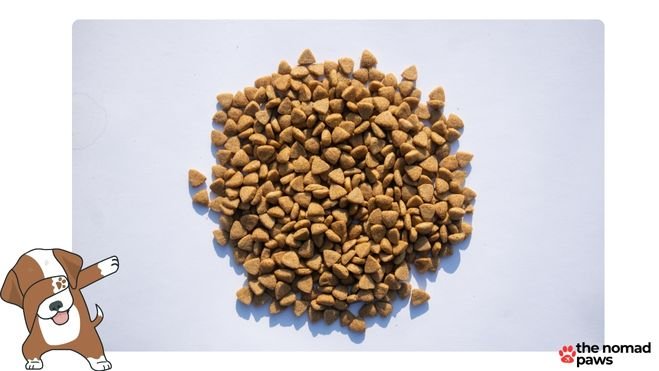
Choosing the right dry kibble for your Maltese can feel like a puzzle, but it’s an essential piece of their overall health.
Look for dog food that lists high-quality animal protein as the first ingredient. Chicken, beef, or fish are excellent options to keep your furry friend energized. Since Maltese are small dogs, pick kibble sized for their tiny mouths to make chewing easier.
Vet’s Tip: Aim for about 45 calories per pound of your Maltese’s weight each day to prevent unwanted weight gain.
Keep an eye on calories too. Don’t forget about those omega-3 fatty acids! They’ll help keep your pup’s coat shiny and skin healthy.
Steer clear of fillers and artificial additives. Your Maltese deserves transparent, nutritious ingredients.
Our Nutritionists Say: Look for dry kibble that includes probiotics to support your Maltese’s digestive health and immune system.
Wet Food for Maltese Dogs

Diving into wet food options for your Maltese can open up a world of tasty possibilities.
Wet food offers increased hydration, which is essential for your pint-sized pup’s health. It’s especially beneficial if your Maltese has dental issues or is a picky eater.
When choosing wet food, look for formulas with real meat as the main ingredient and natural ingredients throughout. Avoid artificial additives and fillers.
Vet’s Tip: Always transition to new food gradually over 7-10 days to avoid digestive upset. Mix increasing amounts of the new food with decreasing amounts of the old food.
For puppies, aim for protein levels between 22% and 32%, while senior dogs need about 20%.
The soft texture of wet food can be easier for your Maltese to chew and digest. It’s also great for shifting from puppy to adult diets – just mix it with dry kibble to ease the alteration.
Remember, high-quality wet food can be a delicious and nutritious choice for your Maltese dog.
Raw Diet
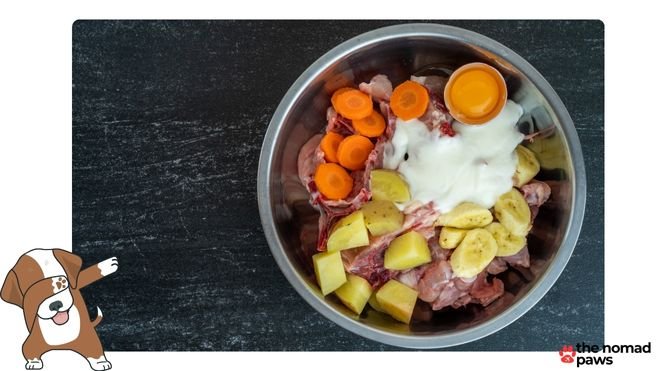
Let’s chew on the idea of a raw diet for your Maltese. This approach typically includes high-quality animal proteins like chicken, beef, or fish, aiming for at least 30% protein content to fuel your pup’s energy needs.
Raw meaty bones are essential for dental health and important nutrients. When shifting to a raw diet, take it slow over a week to avoid tummy troubles.
Mix in some organ meats for crucial vitamins and minerals, and don’t forget to add veggies for fiber and antioxidants.
Vet’s Tip: Always consult with your veterinarian or a pet nutritionist before starting a raw diet for your Maltese. They can help ensure your dog receives all necessary nutrients and address any specific health concerns.
Freeze-Dried Options

Freeze-dried food is like a tasty time capsule for your Maltese.
This lightweight option packs a nutritional punch, retaining most of the goodness from raw ingredients. It’s perfect for your small toy breed, especially if they’re picky eaters.
You’ll find that freeze-dried dog food often features high-quality proteins like chicken or beef, which are essential for your Maltese’s health.
When choosing freeze-dried options, look for formulas specifically designed for small breeds. These typically have smaller kibble sizes that are just right for your Maltese’s tiny mouth.
This makes chewing and digesting easier for your furry friend. Plus, the convenience of freeze-dried food is hard to beat. It’s easy to store, has a long shelf life, and doesn’t need preservatives. Your Maltese will love the flavor, and you’ll appreciate the nutritional benefits.
Grain-Free Benefits for Maltese

If you’re considering grain-free food for your Maltese, you’ll want to weigh the potential benefits against some important health considerations.
Grain-free diets can help reduce food allergies and sensitivities, which are common in Maltese dogs. However, it’s essential to be aware of the potential risks, including nutrient deficiencies and a possible link to dilated cardiomyopathy (DCM) in some dogs fed exclusively grain-free diets.
For Maltese dogs with sensitive tummies, grain-free diets can be a game-changer.
If your furry friend often struggles with itchy skin or tummy troubles, switching to grain-free food might be the solution you’ve been looking for.
These diets typically exclude common allergens like wheat and corn, which can trigger reactions in some Maltese puppies. Instead, they’re packed with easy-to-digest carbs like sweet potatoes and peas.
While grain-free diets can be great for dogs with sensitivities, it’s important to keep an eye on portion sizes.
These foods can be calorie-dense, so proper portioning is key to preventing weight gain. By choosing a balanced grain-free option, you’re helping your Maltese avoid potential allergens while still getting essential nutrients.
DCM Risk in Grain-Free Diets

Now, you might be wondering about the buzz surrounding grain-free diets and DCM (dilated cardiomyopathy) in dogs. It’s a hot topic for Maltese owners like you.
Some studies have raised concerns about a potential link between grain-free diets and DCM in certain breeds. While Maltese dogs aren’t typically at high risk for DCM, it’s still important to be aware of this issue.
Grain-free diets can offer benefits for your Maltese, such as reducing food sensitivities and providing novel protein sources. However, it’s essential to weigh these advantages against potential risks.
Your best bet? Talk to your vet about your Maltese’s specific needs. They can help you decide if a grain-free diet is right for your furry friend and guide you in choosing a balanced, nutritious food that keeps your Maltese healthy and happy.
How Much Should a Maltese Dog Eat?
Your Maltese’s nutritional needs change as they grow, so it’s important to adjust their diet accordingly.
Puppies, adults, and seniors each have unique dietary requirements that support their health and well-being at different life stages.
Let’s explore how you can tailor your Maltese’s meals to guarantee they’re getting the right nutrition throughout their life.
During their first 12 weeks, your pup needs frequent meals to prevent low blood sugar. After that, three meals a day will keep them on track until they’re 9 months old.
When choosing food for Maltese dogs, look for puppy-specific formulas with 22% to 32% protein and 10% to 25% fat. These nutrients support their developing bodies.
Remember, quality matters! Opt for animal-based proteins and include healthy fats and fiber.
Changing foods? Take it slow to avoid tummy troubles. Start with a 1:3 mix of new to old food, gradually increasing the new food over time. Your puppy’s health depends on getting the right nutrition from the start.
Malteses Puppy Feeding Guidelines
Feeding your Maltese puppy correctly is vital for their health and development. For the tiniest pups (8-12 weeks), it’s best to leave food out all day to prevent low blood sugar.
Once they hit 12 weeks, you’ll want to switch to three meals a day until they’re about 9 months old. Don’t worry if your furry friend seems like a bottomless pit – Maltese puppies need plenty of energy to grow!
Vet’s Tip: Monitor your Maltese puppy’s weight closely and adjust portion sizes accordingly. Overfeeding can lead to obesity, which can cause health problems later in life.
When it comes to portion sizes, you’ll need to keep a close eye on your pup. Aim for 1/4 to 3/4 cup of dog food daily, depending on their weight.
Adult Maltese dogs require a diet with about 22% protein to maintain muscle mass and 8-15% fat for energy and skin health.
Vet’s Tip: A diet rich in omega-3 fatty acids is essential for maintaining your Maltese’s luscious coat and healthy skin.
Consider adding fish oil supplements or choosing foods with fish-based ingredients to boost their omega-3 intake.
When it’s time to switch from puppy to adult food around 10-12 months old, take it slow to avoid tummy troubles. Gradually mix in the new food over a week or two.
Adult Malteses Feeding Guidelines
Adult Maltese dogs thrive on 2-3 meals a day, which helps maintain their energy levels and prevents hypoglycemia.
For pups weighing 2-4 lbs, aim for 1/4 to 1/2 cup of food daily. Bigger Maltese (5 lbs or more) need about 1/2 to 3/4 cup.
Keep in mind that your furry companion requires roughly 45 calories per pound of body weight each day. Don’t forget to count those treats! They should be part of your dog’s total daily calorie intake to avoid overfeeding.
Obesity is a common concern in small breeds like Maltese, so watch those portion sizes closely.
Just when you’ve mastered your Maltese’s adult diet, it’s time to think about their golden years!
As your furry friend ages, their nutritional needs change.
Senior Maltese dogs need about 20% protein to maintain muscle mass, and 5.3% fat for energy and healthy skin. Don’t forget fiber – it’s essential for keeping their digestion on track.
Vet’s Tip: Senior Maltese dogs require approximately 20% protein and 5.3% fat in their diet to maintain muscle mass and promote healthy skin.
Keep an eye out for age-related issues like joint problems or sensitive skin.
If you notice these, you might need to boost their intake of omega-3 fatty acids.
Senior Malteses Feeding Guidelines
Senior Malteses require about 0.7 cups of high-quality dog food daily, split into two meals. This helps maintain their energy and prevents blood sugar dips.
Stick to a consistent feeding schedule to avoid hypoglycemia.
Dental Problems in Maltese Dogs

While we’re talking about what goes into your Maltese’s mouth, let’s focus on keeping those pearly whites healthy.
Dental problems are a big concern for these adorable pups. Their tiny mouths and crowded teeth make them prone to plaque buildup and gum disease.
Did you know that 80% of dogs show signs of dental issues by age three?
That’s why it’s essential to start a dental care routine early. Brush your Maltese’s teeth regularly and offer dental chews to help prevent tooth decay.
Avoid foods with artificial additives, as they can contribute to dental problems.
Vet’s Tip: Regular dental check-ups are crucial for Maltese dogs. Schedule professional cleanings at least once a year to maintain optimal oral health and prevent potential systemic issues.
Gradual Food Swap Process
Shifting your Maltese to a new food isn’t just about swapping one kibble for another. It’s essential to observe stool consistency throughout the process.
This tells you how well your pup’s tummy is handling the change. As you mix in the new food, keep a close eye on your Maltese’s bathroom habits.
Firm, well-formed stools are a good sign, while loose or watery stools might indicate an upset stomach. Start with a small amount of new food and gradually increase it over three weeks.
If you notice any digestive issues, slow down the shift and mention it to your vet. Remember, every dog is different, so your Maltese might need more time to adjust.




